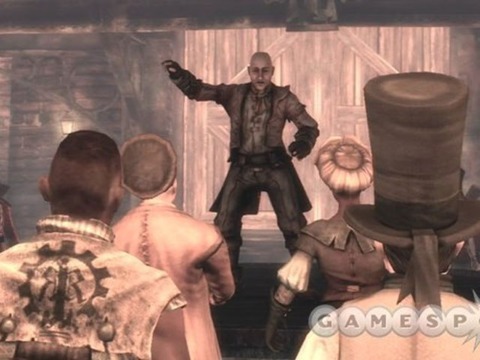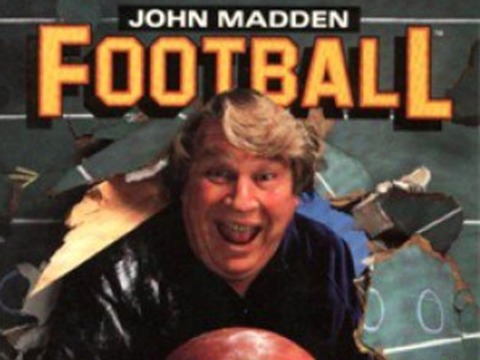Coin-OpEd: Used games are not the same as used underwear
Why, exactly, are gamers being punished for buying their wares on the secondhand market?
When I buy my underwear, I buy it new. There are reasons for this, of course. Argue how you might, but I firmly believe that soap does not hold complete dominion over cloth. Permeability is a clear and present danger here, is what I'm saying, and that is compelling reason enough for me to buy new.
Personal germaphobia notwithstanding, there are plenty of other things people buy that just don't translate well to the secondhand market. Fruit. Fruit is an excellent example of something that should not be bought used. Fruit has a shelf life. Regurgitation would be a necessity after first use of fruit. After regurgitation, fruit would have lost all aesthetic and nutritional value. Don't buy fruit used.

On the other hand, lots of things do work really well the second time around. The clip-on tie that my brother wore on his first day of high school humiliated me just as effectively when I wore it two years later. The monitor I'm looking at to write this editorial? Found on the side of the street. It was just sitting there, and I took it, and it works great. Need a car? Craigslist has a 1994 Minnie Winnie with your name on it. That's 24 1/2 feet of luxury for just $9,800.
Games are also eminently reusable. Those of us with friends have been buying and swapping games for decades at this point, and I certainly recall renting from my local Blockbuster Video. What's more, the reusability of games has spawned a billion-dollar cottage industry, where specialty retailers such as GameStop buy low, sell middle, and earn big.
Whether or not GameStop's value proposition is equitable to gamers is a question for another time. However, used games don't go bad; they offer gamers a chance to experience the exact same content, with all its fidelity and fun, as someone who buys new, but for a sometimes substantially cheaper price. It also means gamers need not have boxes upon boxes of old games in their basements--or worse, simply toss them out.
To be sure, the secondhand games market runs counter to fundamental consumerism, which deemphasizes reconsumption in favor of paying top dollar for the new hotness. Publishers would vastly prefer you buy their games new. To a degree, this mentality is understandable, since a publisher takes a majority cut of a $60 new game but doesn't see a dime from its $45 resale.
Earlier this week, Mike West, who is a lead combat designer at the Microsoft-owned Lionhead Studios, told Eurogamer that the secondary games market is a bigger problem than piracy. Seems a bit harsh. Here's what he said:

"Piracy these days on PC is probably less problematic than secondhand sales on the [Xbox 360]," he said. "I've been working on PC games for many years, and piracy is always a problem. There are a lot of honest people out there as well, and if they like your game, they'll buy it. The pirates, whatever you do on whatever system, they will crack it. It might take no time… I think the longest it's taken to happen is two days. Someone will crack it somewhere and there's not much you can do about it."
"It's just a depressing situation we're in that people don't think it's worth spending money on computer games," he continued. "What they're doing is making sure there are fewer games coming out in the future and more people out of work, which is a terrible thing. Unless you sit down and meet a pirate face to face and have a conversation about what it does, I don't think anything will stop them… But, as I say, second-hand sales cost us more in the long-run than piracy these days."
West's attack on the secondhand market is far from an isolated occurrence. Since 2010, Electronic Arts has been walling off the online modes of many of its popular sports franchises, forcing those who do not buy the game new to pony up $10. THQ and Sony have followed suit with their own versions of EA's Online Pass, and a handful of other publishers, including Ubisoft, have also expressed interest in the scheme.

What these companies are doing is trying to artificially create a situation where buying a preowned game is as attractive as buying preowned underwear. But in truth, there's no reason why a preowned game shouldn't be just as good as a new game, and not only do consumers recognize this, but they have readily available (not to mention legal) means to act upon it.
What can be said? These companies fail to realize that they aren't likely to change consumer behavior by (A) guilting their fans into paying full price for games, or (B) nickel-and-diming them for online modes.
To the first point, as any therapist will say, motivating someone to do something through guilt is one of the fastest ways to build resentment and destroy a relationship. Said another way, if I buy used games, and someone starts making me feel bad for doing so, I'm either going to not buy games at all, or I'm going to steal them instead. (Lest it not be said, I do not condone piracy, or petty theft for that matter.)
In the same vein, charging for online modes is a dramatic departure from what gamers have come to expect after years of precedent, and such a change can only engender ill will among the player base. Further, when a premium is placed on a discounted product, that premium will effectively price out a portion of the population from buying it. (Now, I'm not calling game publishers who engage in this kind of thing capitalist pig-dogs, but a Marxist probably would.)
Bottom line: Publishers are aggressively attacking secondhand sales because the vast majority of games do not sell enough copies to justify their exorbitant development costs. To make up for that deficit, publishers have resorted to punishing the consumer. Perhaps it would make more sense if these publishers reexamined their own method for creating games and worked within their financial constraints to create a sustainable business model instead.
Got a news tip or want to contact us directly? Email news@gamespot.com
Join the conversation